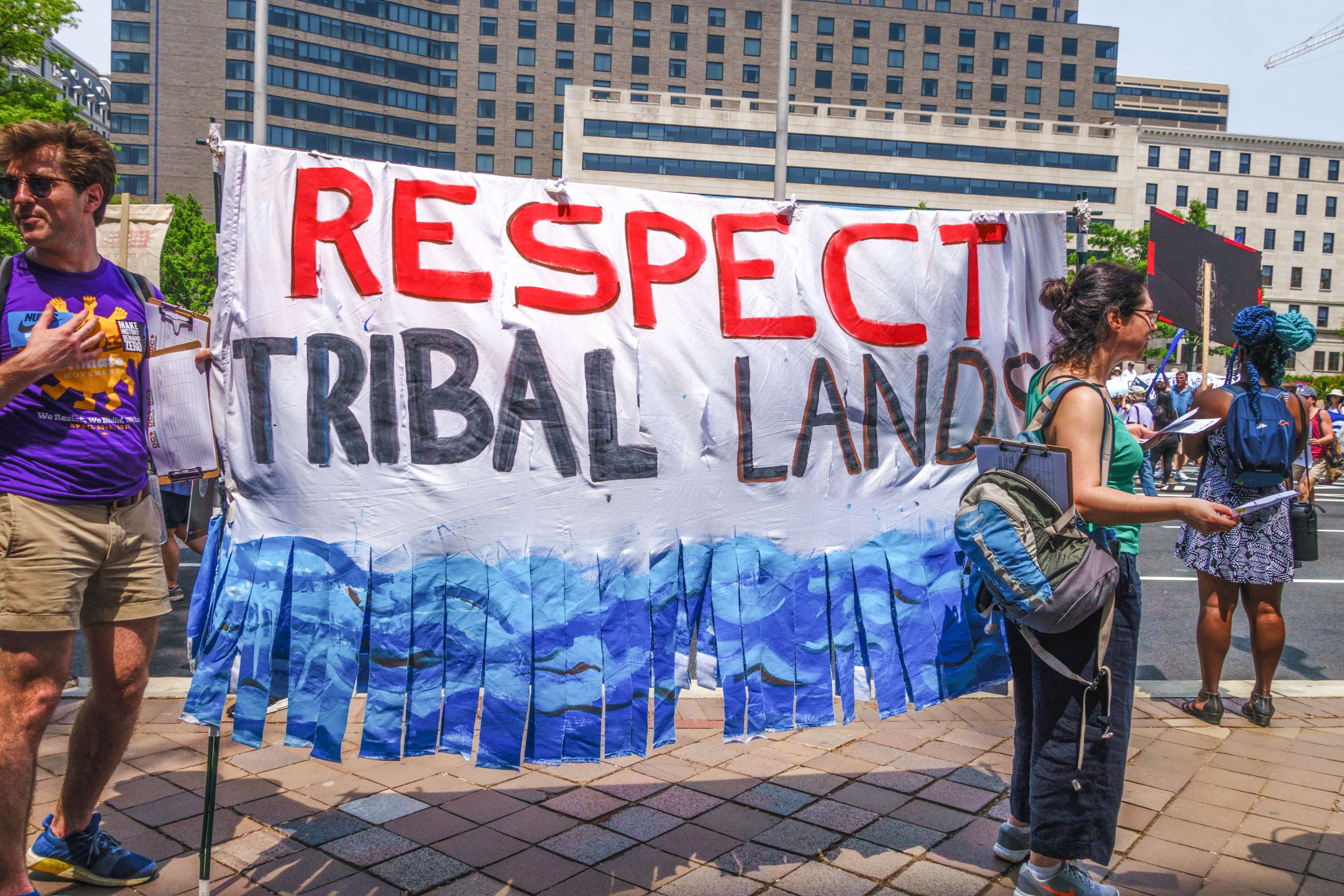What is social justice?
Origins and definitions, plus social injustice examples

In an October 1932 address, future president Franklin D. Roosevelt highlighted the pitfalls of a philosophy he labeled "letting things alone."
This leads to the "survival of the so-called fittest" at the expense of the more vulnerable people in society, he said.
He proposed an alternative philosophy – "social justice through social action," which "results in the protection of humanity."
He concluded by saying that society "must and shall choose the path to social justice" – words that are still relevant almost 100 years on.
Social justice today
Roosevelt's idea of social justice at this time focused on dealing with poverty, but he later expanded this to include areas such as civil rights and job security.
Nowadays, social justice relates to much more than this, touching every aspect of society.
But what is it exactly?
In this article, we explore our archives to highlight a variety of definitions and meanings of social justice. We also highlight social justice issues and social injustice examples, and look at the origins of the term.

Key points
- Theories of social justice emerged in the second half of the 20th century following the drafting of the Universal Declaration of Human Rights (UDHR) in 1948
- There are many contemporary definitions of social justice
- Social justice issues include social discrimination, health inequality, the effect of climate change on specific groups, and homelessness
A brief history of social justice
The notion of social justice goes back thousands of years.
There's evidence that philosophers such as Plato (427–347 B.C.), Thomas Aquinas (1225–1274), and Immanuel Kant (1724–1804) addressed social justice issues. Themes of justice and injustice have also been found in religious texts and practices.
Use of the term
One of the earliest known uses of "social justice" was in 1840 by Luigi Taparelli, an advisor to the Vatican.
Scholars believe he used the term to make a case for why poor and disenfranchised people should be treated the same as others in society.
An early use of the term in a Taylor & Francis journal was in the Journal of the American Statistical Association in an article about state pensions in 1908.
Codifying social justice
The injustices and economic issues brought on by war, the Great Depression, and the dismantling of colonial empires in the first half of the 20th century led to efforts to codify a moral code with social justice at its core.
This led to the U.N. (United Nations) Charter in 1945, and the Universal Declaration of Human Rights (UDHR) – drafted by a U.N. committee chaired by Eleanor Roosevelt – in 1948.
The UDHR covered more than traditional Western civil rights, despite limited input from the African regions that were still under colonial rule. It included two categories of rights:
- Political/civil
- Social/economic
Modern theories
The U.N. began using the term "social justice" in the late 1960s, sometimes interchangeably with "equality" and "equity."
Meanwhile, other theories of social justice emerged in the late 20th century and early 21st century. These include John Rawls' theory of justice, which argues that our behavior is influenced by the institutions we create, and Nancy Fraser's three dimensions of social justice:
- Redistribution (of resources)
- Recognition (of marginalized groups)
- Participation (of individuals and groups)
Today, most discussions around social justice explore what a "just" society would look like, and the injustices people face because of factors such as race, gender, ethnicity, class, religion, age, sexual orientation, and where they live.
Academic interest in social justice is growing. From 2013 to 2022, there were more than 47,000 Taylor & Francis articles published that included the term "social justice." These are in areas including everything from education and health to leisure and engineering.




Contemporary definitions of social justice
Scholars argue that definitions of social justice should depend on the context and there have been many definitions proposed over the years.
These are some of the contemporary definitions of social justice.
"Promoting a just society"
In the book, Social Justice, Criminal Justice, Cyndy Caravelis and Matthew Robinson cite a definition penned by Toowoomba Catholic Education in 2006.
It says that social justice is "promoting a just society by challenging injustice and valuing diversity."
It exists when "all people share a common humanity and therefore have a right to equitable treatment, support for their human rights, and a fair allocation of community resources."
Caravelis and Robinson also point out that social justice is not an objective of criminal justice.
"Aggregated fairness"
In their 2020 article, "Is social justice the superior economic growth model? Comparative analysis on G20 countries," Shijun Li and Bing Wang say that social justice is "an aggregated fairness of authorized values..."
This includes "income, well-being, opportunity, freedom, liberty, rights, and needs."
"Rights-based initiatives"
Michael Reisch, editor of The Routledge International Handbook of Social Justice, outlines the meaning of social justice in his introduction to the book.
He says the term refers to "social policies and other rights-based initiatives that protect vulnerable and disadvantaged groups of national or global society from oppression, discrimination, and exclusion, or that support them materially."
"A society which is just and equitable"
In a 2016 article in the International Review of Psychiatry, Dinesh Bhugra, Emeritus Professor of Mental Health and Cultural Diversity at King's College, London, says:
"Social justice is aimed at promoting a society which is just and equitable, valuing diversity, providing equal opportunities to all its members, irrespective of their disability, ethnicity, gender, age, sexual orientation or religion, and ensuring fair allocation of resources and support for their human rights."
"Responsibility to care for others"
In an article about the teaching of social justice, David Robinson cites this definition from South Africa's Revised National Curriculum Statement (RNCS):
"In simple terms, social justice refers to one's responsibility to care for others [for] the common good of society.
"Social justice serves to remind all humanity (government and civil society) that the needs of all individuals and societies should be met within the constraints imposed by the biosphere and that all should have equal opportunity to improve their living conditions."
Societal and political
In "Language and social justice in South Africa's higher education: insights from a South African university," Munene Mwaniki, citing Ben Jackson, says:
"...the concept of social justice can be distinguished on two main grounds.
"First, justice is conceptualised as a virtue that applies to a 'society' and not simply to individual behavior: social institutions that distribute material resources and social positions are open to assessment as just or unjust.
"Second, social justice also has a substantive political content: it recommends the alleviation of poverty and the diminution of inequality (or at least certain dimensions of it) as a matter of justice rather than charity."
"Peaceful and prosperous coexistence"
A recent definition of social justice from the U.N. focuses on its role in building robust relationships between nations:
"Social justice is an underlying principle for peaceful and prosperous coexistence within and among nations.
"We uphold the principles of social justice when we promote gender equality or the rights of indigenous peoples and migrants.
"We advance social justice when we remove barriers that people face because of gender, age, race, ethnicity, religion, culture, or disability."
Social injustice examples
Despite societal advances since the signing of the UDHR, there is still social injustice and inequality in every region of the world.
Examples of social injustice include the following issues. Many of these were made worse by the COVID-19 pandemic.
Access to education and jobs
E.g. the gender pay gap, making sure that girls have the same educational opportunities as boys, and people can afford to live near their workplace
Social discrimination
E.g. sustained discrimination against individuals or groups on the basis of gender, illness, disability, religion, sexual orientation, or any other measures of diversity
Food and water insecurity
E.g. the effect of tourism on water supplies, child hunger, and the rise of food insecurity in urban areas
Distribution of wealth
E.g. how government spending is distributed among the population, how global wealth is governed, and the gender pay gap
Police discrimination and violence
E.g. the murder of George Floyd and police bias against specific groups
Health inequality
E.g. racism in healthcare and the impact of COVID-19 on vulnerable households
Effects of climate change, pollution, and environmental hazards
E.g. the effects of climate change on Pacific islands and air pollution on specific communities
Land rights and access to land
Reproductive rights
E.g. access to safe abortions and protection from female genital mutilation (FGM)
Housing and homelessness
E.g. how specific groups are more at risk of being homeless, and the impact housing can have on health
Voting rights
E.g. the voting rights of refugees, and ensuring disabled people can participate in democratic processes
Access to information
E.g. censorship of digital journalism, and digital inequality
Further reading
Journal articles
- Reclaiming commitment to social justice through relevant adult and continuing education in sub-Saharan Africa by Akpovire B. Oduaran in Africa Education Review
- Social justice: a historical and philosophical perspective by Sharon Kay Stoll in Journal of Physical Education, Recreation & Dance
- "The path of social justice": A human rights history of social justice education by Carl A. Grant and Melissa Leigh Gibson in Equity & Excellence in Education
- Social justice in counseling: moving to a multiplistic approach by Harvey Charles Peters and Melissa Luke in Journal of Counselor Leadership and Advocacy
Books and book chapters
- Helping to Promote Social Justice edited by Debra A. Harkins, Kathryn J. Kozak, Lauren I. Grenier, and Lynne-Marie Shea
- John Rawls and Environmental Justice: Implementing a Sustainable and Socially Just Future by John Töns
- Human Rights and Social Justice: Key Issues and Vulnerable Populations edited by Carole Cox and Tina Maschi
- Religious Influences on Justice Theory by Daniel C. Maguire in Routledge International Handbook of Social Justice
- Social Justice, Criminal Justice: The Role of American Law in Effecting and Preventing Social Change by Cyndy Caravelis and Matthew Robinson
- Social Justice and Medical Practice: Life History of a Physician of Social Medicine by Merrill Singer and Rebecca Allen
- Social Justice and the City edited by Nik Heynen
- The Emergence of Social Justice in the West by Walter Lorenz in Routledge International Handbook of Social Justice
You might also like:
Social justice and sustainability
Find out about the content we publish, commitments we've made, and initiatives we support related to social justice and sustainability:
 China
China Africa
Africa












